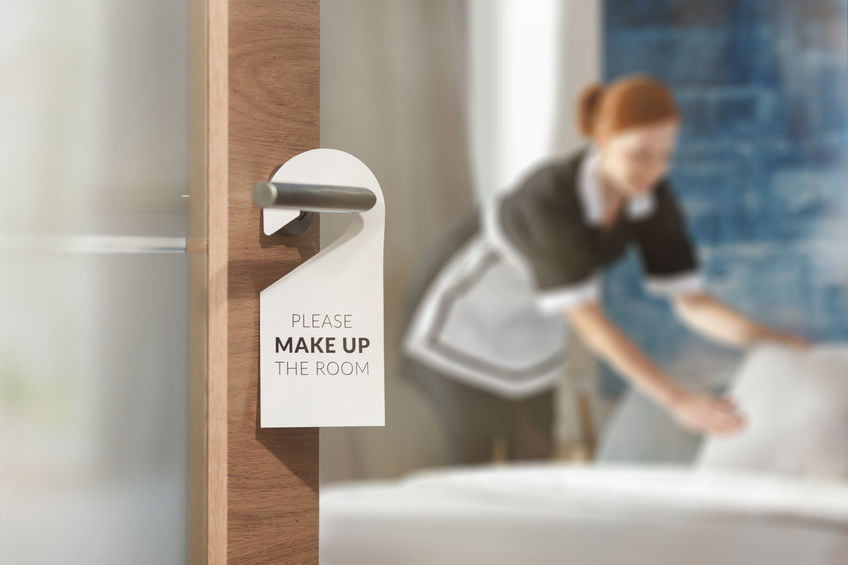New Jersey’s Governor Phil Murphy signed a bill in June 2019 intended to help protect hotel housekeeping and room service workers against assault and harassment whilst working alone.
Senate back new lone worker legislation
“We must protect the safety of workers in the hospitality industry,” said Governor Murphy. “This new law will ensure that hotel employees performing their duties will have the means to summon immediate assistance if they are in danger.”¹
The bill, S.2986, sponsored by Senator Lorreta Weinberg and Senator Linda Greenstein, came into effect in January of 2020, and requires hotel employers to provide a “panic button” device to employees who are assigned to work in a guest room without co-workers present. If the device is activated, an appropriate staff member, such as a manager, security officer or supervisor, must respond immediately to the worker’s location.
“Their line of work combines anonymity with seclusion and the risk of harassment and assault is a reality hotel workers face every day,” said Senator Linda Greenstein. “This law will give these employees a sense of safety most of us take for granted in our places of work and will empower them to protect themselves when in danger.” ²
Legislation Bill S.2986
The legislation applies to all hotels, motels or lodgings which contain at least 25 guest rooms. Within the bill, “Panic button” means a portable emergency contact device which an employee can quickly and easily activate to effectively summon immediate on-scene assistance from a security officer, manager or supervisor, or other appropriate hotel staff member. ³
The Legislature declares in item 3.a,
‘A hotel employer shall provide a panic button to each hotel employee assigned to work in a guest room without any other employees present, at no cost to the employee. An employee may use the panic button if the employee reasonably believes there is an ongoing crime, harassment, or other emergency in the employee’s presence. The hotel employee may cease work and leave the immediate area of perceived danger or inappropriate conduct to await the arrival of assistance, and no adverse action may be taken against the hotel employee for such action.’ ⁴
Long Lasting consequences for Accused
The supplying of a panic button and access to assistance is becoming more widespread across cities and states, however New Jersey has taken the safety of staff one step further. The bill requires hotels to keep records of incidents reported and ‘maintain the name of the guest so accused on the list for a period of five years from the date of the incident’. ⁵
New Jersey also insists on hotels carrying out an investigation of all incidents and ‘upon conclusion of the investigation, if the hotel employee provides a certified statement of an incident involving an assault or sexual harassment, or if the hotel employer determines there is information in addition to or independent of a hotel employee’s statement that reasonably supports the hotel employee’s description of the incident, the hotel shall decline to provide occupancy to the guest for a period of at least three years from the date of the incident.’ ⁶
Any hotel employer who violates any provision of S.2986 is subject to a civil penalty up to $5,000 for the first violation and $10,000 for each subsequent violation.
Panic buttons and Lone Worker Solutions
There are many panic button and lone worker solutions available for hotel owners to keep their lone workers safe. Solutions are simple systems that connect workers with a supervisor who monitors their well-being. One such solution is Ok Alone, the lone worker safety solution from Trusty Ox Systems.
Ok Alone’s lone worker safety app runs on a worker’s smart phone and allows workers to check in at regular intervals or request help if they need it. A unique feature of the Ok Alone solution is its ability to be used completely hands-free with voice commands. Android or iPhone verbal short cuts can be programmed into the app, allowing workers to start shifts, check in and request immediate help without touching their phone.
The system has GPS capabilities that can locate a worker if they activate the ‘help’ alert. Through the app, a supervisor or security personnel, will be notified if a worker requests immediate assistance, keeping in line with the bill S.2986.
Ok Alone’s safety features
The Ok Alone system has a wide range of features designed to make workers feel safer. Workers are able to change the frequency of their check ins with the ‘high-risk’ feature. If a worker enters an area they feel vulnerable, like counting inventory alone in a stock room, they can reduce the check in time to as little as 10 minutes. After the time has passed with no alerts, the check in frequency will revert back to the original count down duration.
The Man Down (Worker Down) function will alert monitors if there has been no movement from a worker within a set amount of time. This could help indicate if the worker has been assaulted or incapacitated by a guest and needs immediate assistance.
The Ok Alone smartphone app works in conjunction with a website and dashboard that can be used on a pc, laptop, tablet or another smartphone. The online dashboard will display a map supplying the monitor with the workers last known location if an alert is triggered.
1, 2 –https://www.nj.gov/governor/news/news/562019/approved/20190611a.shtml
3, 4, 5, 6 –https://www.njleg.state.nj.us/2018/Bills/S3000/2986_I1.HTM

As an expert in lone worker content management, I possess an extensive knowledge base and experience in the area of lone working and safety monitoring. My expertise in this field encompasses a wide range of areas, including risk assessment, training, communication, and technology. I have a deep understanding of the unique risks associated with lone workers and have researched and written many projects and articles to educate people in how to mitigate these risks.
Throughout my time with Ok Alone, I have kept up to date with technological developments, legislative changes and regulations that have been introduced to help organizations ensure the safety of their lone workers.

